5+ Sample Internship Narrative Report
-
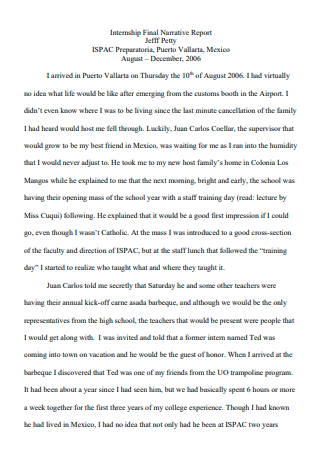
Internship Final Narrative Report
download now -
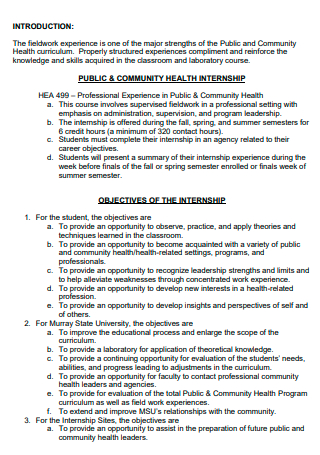
Basic Internship Narrative Report
download now -
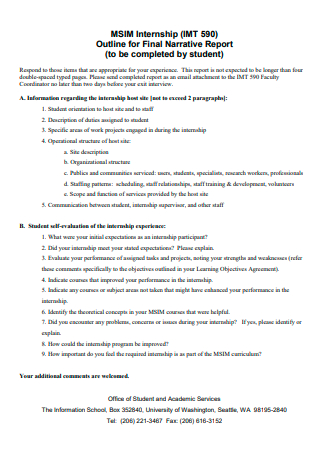
Internship Outline For Final Narrative Report
download now -
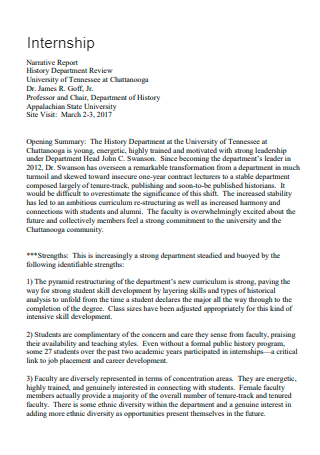
Internship Narrative Report Example
download now -
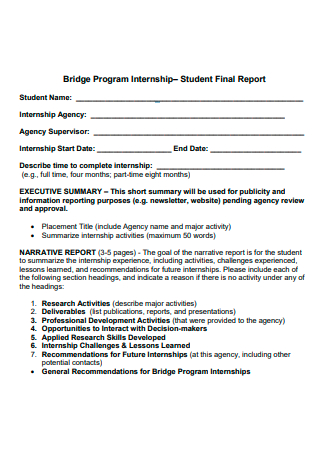
Program Internship Student Final Narrative Report
download now -
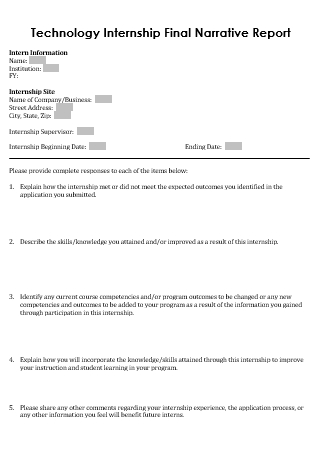
Technology Internship Final Narrative Report
download now
FREE Internship Narrative Report s to Download
5+ Sample Internship Narrative Report
What Is an Internship Narrative Report?
Key Characteristics of a Successful Internship
Pointers for Writing a Good Narrative Report
How to Write an Internship Narrative Report
FAQs
When is an internship narrative report necessary?
How long is an internship narrative report?
What is the objective of the internship narrative report?
What Is an Internship Narrative Report?
An internship narrative report is a Summary of your internship experience that is expected to be submitted at the end of the internship program. Your internship narrative report contains pertinent information regarding your internship experience, such as a description of your position with the organization, tasks done, and skills developed. This report may be used by your director to improve internship options or lessons for new students. This article has readily provided you with an internship narrative report example as an additional reference. You will find that utilizing an online internship narrative report will be beneficial in saving you time and effort.
Key Characteristics of a Successful Internship
Finding a quality Internship that will further enhance your skill set can prove to be a challenge. Since most students or interns will want to prioritize an experience that is most beneficial to them, there may be other factors or key qualities that will be forgotten. This is why this article included a curated list that you need to keep in mind so that you can get the most out of your internship experience. With that being said, proceed through the list and take note of the mentioned points.
Pointers for Writing a Good Narrative Report
Rather than summarizing your experience for the reader, it conveys it and lets them form their conclusions. Rather than pounding the reader like a rhetorical essay or presenting in-depth analysis like a critical essay, the narrative essay communicates its point by subtly guiding them. You can strengthen your narrative essay by following these basic concepts. These tips are just as useful for any narrative writing which is why you can make use of the knowledge you learn from this list.
How to Write an Internship Narrative Report
A narrative report for internship experience should include crucial elements from your internship. It should also contain a summary of the abilities you acquired. Keep in mind, however, that whatever directions your internship supervisor gave you regarding your report should be followed to the letter. The required material, formatting, due dates, and other details may be included in these guidelines. If you are lost on what specific contents to include in the document, you can look into the provided narrative report for the internship sample readily available in this article.
-
1. Title Page
List your name, the internship company program in which you are under, the internship director or adviser, the internship site, and the specific semester in which the internship will be completed. You can also include the class, date, and the name of the organization on a title or cover page. This distinguishes your report from those of other interns who may be submitting reports as well. It is important that you still follow the specific format set by your supervisor but also set you apart from them so that the readers can easily identify you from the others.
-
2. Table of Contents
The contents of the internship narrative report, as well as where they may be located in the report, should be listed within this section. A Table of Contents can also be helpful while writing your internship narrative report especially if you are tasked to write a comprehensive and quite lengthy document. This should be the second page of your report after the title or cover page since it helps readers to jump to the sections of the report that they want to read.
-
3. Include Details about the Company
Your internship narrative report should include a brief history of the organization. Include facts such as the company’s founding date, its purpose or mission statement, the types of jobs it performs daily, and any other relevant information. The reader, whether it is your company supervisor or your academic institution professor will gain a better comprehension of your experience if you provide context. This would also help the readers understand the state of the company and how the progress of their company has been beneficial to you.
-
4. Include Your Internship Position and Responsibilities
A description of the internship site and the scope of your work done during the internship should be stated within this section. It may provide background knowledge that is important to comprehend the internship work. Additionally, this section includes an overview of the work done during the internship as well as a comment on its relevance. It’s similar to a research paper’s results and discussion part. It is acknowledged that students may work on confidential projects that cannot be mentioned in detail in some situations. In certain cases, it may be vital to concentrate more on the techniques used rather than the outcomes.
-
5. Learning or Internship Objectives
This is the section where you dedicate a page to the internship’s initial aims. You will detail the precise things you learned and the abilities you developed in the major section of your internship narrative report. Relate these abilities to your educational background. Describe one-of-a-kind experiences you experienced while working for the company that aided your professional development. It is important to comprehensively detail what you have learned from your internship, list the added skills and valuable experiences you have garnered so that the company supervisor or your academic professor will be able to assess your time with the company or Organization.
-
6. Conclude with Ongoing Considerations
It’s also a good idea to think about what talents or experiences you would like to gain. For instance, if you wish you had had more direct client experience, talk about it. You could also highlight your desire to be more involved in the technical aspects of the company. This method gives you insight into areas you would like to work on more in your next job, as well as suggestions for how the organization may enhance its internship program. This helps notify your internship advisor on what specific skills or tasks you want to work on in the future or next assignment.
FAQs
When is an internship narrative report necessary?
An extensive Internship Report is not required by all educational programs, sometimes they may only ask for a simple one-page essay that details your experience. If your company requires one, make sure you give yourself enough time to prepare it. To remember any key details from your internship, you may find it helpful to write notes. Even if your program does not need an internship narrative report, it can serve as a personal resource for evaluating this crucial learning experience. If you forget what section is necessary for the document, then review the steps provided in this article.
How long is an internship narrative report?
Make it as professional-looking as possible. Consider it your internship’s writing showcase. It should be approximately 10 pages long, excluding the appendix. The length of two-credit internship narrative reports should be at least five pages, excluding the appendix. Instead of an appendix, you might provide a separate, professional-quality portfolio of your internship work. If you pick this option, the overview, narrative, and self-evaluation chapters of your report must be at least six pages long. If your company has a prescribed format, you should comply with that so approach your internship supervisor and ask them for it.
What is the objective of the internship narrative report?
The internship narrative report has several functions: it aids in the development of written communication skills, acts as an archival record of the internship experience, and allows the student to reflect on the professional components of the internship experience and the skills learned. Additionally, it gives students with relevant work experience in their chosen field of concentration, allowing them to put what they have learned within the company to good use and uncover new information to help them develop their skills for their desired career.
An internship is important for various reasons, not only would it help the student to be immersed in their desired field or potential career, but it can also enhance the skills they have for the future. Companies need a form of a document other than an acknowledgment letter to assess the performance you have executed. An additional document that can help you out could be through viewing the work immersion narrative report example found within this article. What are you waiting for? You are cleared and ready to start writing now so you can submit it to your company supervisor!
